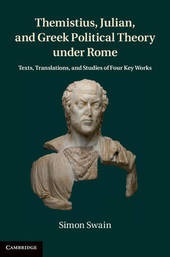
|
Themistius, Julian, and Greek Political Theory under Rome: Texts, Translations, and Studies of Four Key Works
Hardback
Main Details
| Title |
Themistius, Julian, and Greek Political Theory under Rome: Texts, Translations, and Studies of Four Key Works
|
| Authors and Contributors |
By (author) Simon Swain
|
| Physical Properties |
| Format:Hardback | | Pages:229 | | Dimensions(mm): Height 236,Width 158 |
|
| Category/Genre | Literary studies - classical, early and medieval |
|---|
| ISBN/Barcode |
9781107026575
|
| Classifications | Dewey:937.080922 |
|---|
| Audience | | Professional & Vocational | |
|---|
|
Publishing Details |
| Publisher |
Cambridge University Press
|
| Imprint |
Cambridge University Press
|
| Publication Date |
28 November 2013 |
| Publication Country |
United Kingdom
|
Description
Themistius' close relationship with Christian emperors from Constantius to Theodosius makes him one of the most important political thinkers and politicians of the later fourth century, and his dealings with Julian the Apostate have recently attracted much speculation. This volume presents a new critical edition, translation and analysis of Themistius' letter to Julian about kingship and government, which survives mainly in Arabic, together with texts, translations and analyses of Julian's Letter to Themistius and Sopater's Letter to Himerius. The volume is completed with a text, translation and analysis of the other genuine work of Greek political theory to survive in Arabic, the Letter of Aristotle to Alexander, which dates from an earlier period and throws into relief the particular concerns of Themistius, Julian, and the rulers of the fourth-century Roman world.
Author Biography
Simon Swain is Professor of Classics and Chair of the Faculty of Arts at the University of Warwick. He is the author of a number of well-known studies of the Greek literature of the Roman period, including most recently Economy, Family, and Society from Rome to Islam (Cambridge, 2013).
Reviews'Swain's book makes a significant contribution to our understanding of political theory and rhetoric in the High Empire and allows classicists access to texts previously out of the mainstream of research.' Patrick Paul Hogan, Bryn Mawr Classical Review
|